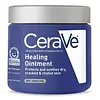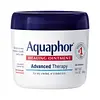What's inside
What's inside
 Key Ingredients
Key Ingredients

No key ingredients
 Benefits
Benefits

 Concerns
Concerns

 Ingredients Side-by-side
Ingredients Side-by-side

Paraffinum Liquidum
EmollientParaffin
PerfumingOzokerite
Emulsion StabilisingDimethicone
EmollientHyaluronic Acid
HumectantSodium Hydroxide
BufferingCeramide EOP
Skin ConditioningCeramide NP
Skin ConditioningCeramide AP
Skin ConditioningTocopheryl Acetate
AntioxidantPhytosphingosine
Skin ConditioningCholesterol
EmollientSodium Lauroyl Lactylate
EmulsifyingCarbomer
Emulsion StabilisingPanthenol
Skin ConditioningWater
Skin ConditioningProline
Skin ConditioningXanthan Gum
Emulsifying
 Reviews
Reviews

Alternatives
Ingredients Explained
These ingredients are found in both products.
Ingredients higher up in an ingredient list are typically present in a larger amount.
Panthenol is a common ingredient that helps hydrate and soothe the skin. It is found naturally in our skin and hair.
There are two forms of panthenol: D and L.
D-panthenol is also known as dexpanthenol. Most cosmetics use dexpanthenol or a mixture of D and L-panthenol.
Panthenol is famous due to its ability to go deeper into the skin's layers. Using this ingredient has numerous pros (and no cons):
Like hyaluronic acid, panthenol is a humectant. Humectants are able to bind and hold large amounts of water to keep skin hydrated.
This ingredient works well for wound healing. It works by increasing tissue in the wound and helps close open wounds.
Once oxidized, panthenol converts to pantothenic acid. Panthothenic acid is found in all living cells.
This ingredient is also referred to as pro-vitamin B5.
Learn more about PanthenolParaffinum Liquidum is also known as liquid paraffin. It is a type of highly refined mineral oil.
Like other oils, Paraffinum Liquidum has emollient properties. Emollients help soothe and soften the skin. By creating a barrier to trap moisture within, emollients help keep your skin hydrated.
Paraffinum Liquidum does not irritate the skin and is non-comedogenic.
Learn more about Paraffinum Liquidum